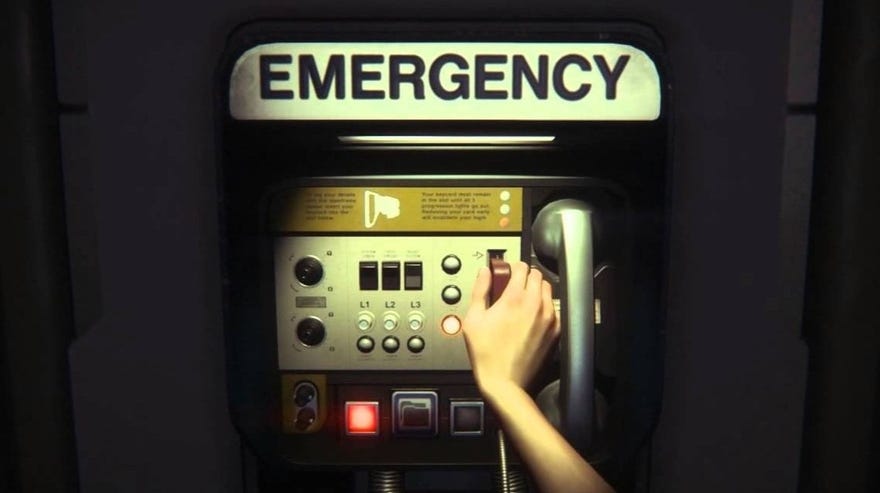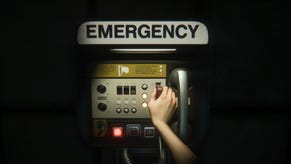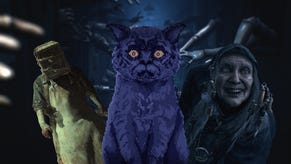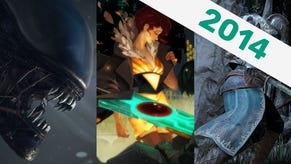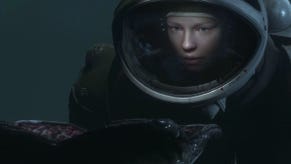Alien: Romulus has turned Alien: Isolation's savegame mechanic into a way of spoiling its own scares
Or more generously, building suspense
Among the many, Gigery beauties of 2014's Alien: Isolation is that you save using an in-game, wall-mounted Emergency Phone - a maddeningly analog process of slotting a keycard into the machine and waiting for three beeps. Doing this requires you to stand upright in full view, with your back turned upon an entire space station's worth of shiny domed technology and guttural industrial noises. Delightful!
Amongst the players harrowed and compelled by this fixture is Fede Álvarez, director of the 2013 Evil Dead remake, 2016's Don't Breathe and, most recently Alien: Romulus - the seventh and avowedly "back to basics" Alien movie. Isolation is the Alien experience that convinced Álvarez the Alien could still be scary, after decades of milking the creature's dugs for spin-off movies and making it share a screen with the Predator, the Pepsi Max to Alien's Dom Pérignon 1921. In possibly self-defeating homage to Creative Assembly's work, he's filled the movie with Emergency Telephones, turning them into a straightforward-sounding form of foreshadowing.
"Alien: Isolation was kind of what made me see that Alien could truly be terrifying and done well [today]," Álvarez told Total Film in an interview passed along by Gamesradar. "I played a few years after it came out. Don't Breathe was coming out. Or was I waiting for Don't Breathe to come out, and I was playing the game. That's why, at the time, I was like, 'fuck, if I could do anything, I would love to do Alien and scare the audience again with that creature and those environments'. I was playing, and realising how terrifying Alien could be if you take it back to that tone."
It's not clear how much Romulus borrows from Isolation, but the premise is certainly redolent: the film sees a cast of foolhardy young colonists scavenging from a derelict space station, which proves to be a nest of slithering horrors. And telephones. "The movie is set up in a way [that] every time something bad is about to happen, you will see a phone," Álvarez explained. "In the game, every time you knew there's a phone you'd go 'fuck, I'm about to go into some bad set-piece'. It's the same thing here. You'll see they're planted strategically throughout the film. When you see the phone, it's like, brace for impact."
I find this Easter egg (kindly reminder: you should be wary of anything egglike in an Alien scenario) intriguing for a couple of reasons. Firstly: assuming this isn't a bluff, Álvarez has sort of spoiled the movie's scares in advance. As and when I see Romulus, I'm going to be playing Spot The Telephone and taking refuge behind my comfort blanket accordingly. Secondly, I like how Álvarez has entangled the cues and expectations of video games and film, trusting in the audience to be savvy with each medium. Perhaps his next picture could try something similar with large, empty arenas decked with chest-high walls and oil barrels. Is there a cinematic equivalent for discovering a pile of health refills next to an innocent-looking exit door?
Dutiful closing note that Alien: Isolation has no sequel despite the praise, and that we’re unlikely to get one given that Sega have recently tasked Creative Assembly with focusing on what they're best known for, aka Total War. There are Alien games in the offing, at least. We've heard rumblings of a new project at Aliens: Fireteam Elite developers Cold Iron, though the developers have yet to confirm whether it's Xenomorph-related. In other news, while it's possible to die while saving in Alien: Isolation, you can be reasonably assured at least that quitting while saving won't wreck your save file.
